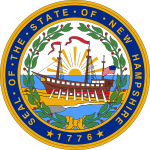
The 13th United States Congress was a meeting of the legislative branch of the United States federal government, consisting of the United States Senate and the United States House of Representatives. It met in Washington, D.C. from March 4, 1813, to March 4, 1815, during the fifth and sixth years of James Madison's presidency. The apportionment of seats in the House of Representatives was based on the 1810 United States census. Both chambers had a Democratic-Republican majority. The first two sessions were held at the Capitol building while the third, convened after the Burning of Washington, took place in the First Patent Building.

John Parker Hale was an American politician and lawyer from New Hampshire. He served in the United States House of Representatives from 1843 to 1845 and in the United States Senate from 1847 to 1853 and again from 1855 to 1865. He began his congressional career as a Democrat, but helped establish the anti-slavery Free Soil Party and eventually joined the Republican Party.
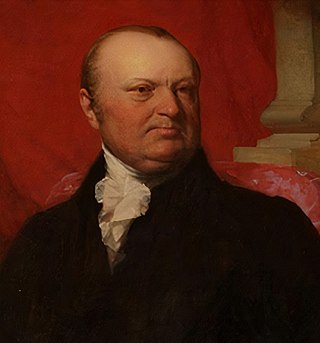
John Taylor Gilman was a farmer, shipbuilder and statesman from Exeter, New Hampshire. He represented New Hampshire in the Continental Congress in 1782–1783 and was the fifth governor of New Hampshire for 14 years, from 1794 to 1805, and from 1813 to 1816.
The 1814–15 United States House of Representatives elections were held on various dates in various states between April 26, 1814, and August 10, 1815. Each state set its own date for its elections to the House of Representatives before the first session of the 14th United States Congress convened on December 4, 1815. They occurred during President James Madison's second term. Elections were held for all 182 seats, representing 18 states.

The 1812–13 United States House of Representatives elections were held on various dates in various states between August 3, 1812, and April 30, 1813. Each state set its own date for its elections to the House of Representatives before the first session of the 13th United States Congress convened on May 24, 1813. They coincided with James Madison being re-elected president.

William Badger was an American manufacturer and mill owner from Gilmanton, New Hampshire. He served in both houses of the New Hampshire state legislature and was the 15th governor of New Hampshire from 1834 to 1836.
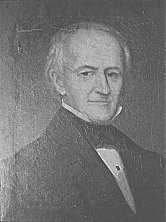
Henry Hubbard was a member of the United States House of Representatives from 1829 to 1835, a Senator from New Hampshire during 1835 to 1841, and the 18th governor of New Hampshire from 1842 to 1844.
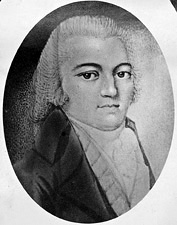
John Fabyan Parrott was a United States representative and a Senator from New Hampshire.
Samuel Taggart was a Presbyterian Minister, an American politician and a U. S. Representative from Massachusetts.

Thomas Weston Thompson was an American attorney and Federalist politician in the U.S. state of New Hampshire. He served as a United States representative and United States Senator during the 1800s.

New Hampshire's 2nd congressional district covers the western, northern, and some southern parts of New Hampshire. It includes the state's second-largest city, Nashua, as well as the state capital, Concord. It is currently represented in the United States House of Representatives by Democrat Maggie Goodlander.
Josiah Butler was an American politician and a United States representative from New Hampshire.
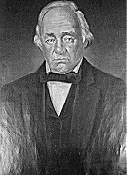
Aaron Matson was a United States representative from New Hampshire. He was born in Plymouth, Massachusetts. He moved to Cheshire County, New Hampshire, where he was the county judge of probate.

William Merchant Richardson was a member of the U.S. House of Representatives from Massachusetts and chief justice of the New Hampshire Supreme Court.
Francis White was a distinguished early American lawyer and politician in what was then the U.S. state of Virginia.

Matthew Harvey was a United States representative from New Hampshire, the 13th governor of New Hampshire and a United States district judge of the United States District Court for the District of Massachusetts.
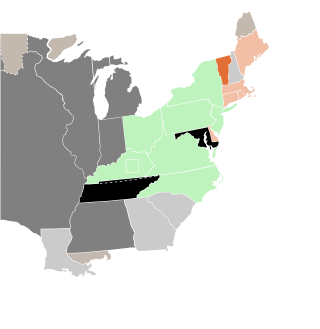
The 1814–15 United States Senate elections were held on various dates in various states. As these U.S. Senate elections were prior to the ratification of the Seventeenth Amendment in 1913, senators were chosen by state legislatures. Senators were elected over a wide range of time throughout 1814 and 1815, and a seat may have been filled months late or remained vacant due to legislative deadlock. In these elections, terms were up for the senators in Class 1.

New Hampshire state elections in 2016 were held on Tuesday, November 8, 2016. Voters elected 4 electors in the electoral college for President of the United States, one Senator in the United States Senate, 2 members to the United States House of Representatives, the Governor of New Hampshire, all five members to the Executive Council, all 24 members to the New Hampshire Senate, and all 400 members to the New Hampshire House of Representatives, among other local elected offices. The Democratic and Republican presidential primary were held on February 9, 2016, and the primary elections for all others offices were held on September 13, 2016.

The 1814 New Hampshire gubernatorial election was held on March 8, 1814.
